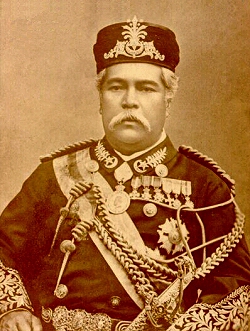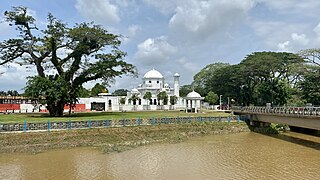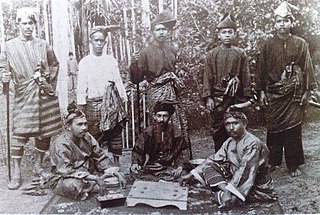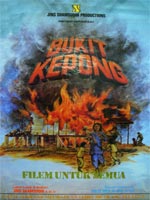Related Research Articles

Silat Melayu, also known as Seni Persilatan Melayu or simply Silat, is a combative art of self-defence from the Malay world, that employs langkah ('steps') and jurus ('movements') to ward off or to strike assaults, either with or without weapons. Silat traced its origin to the early days of Malay civilisation, and has since developed into a fine tradition of physical and spiritual training that embodies aspects of traditional Malay attire, performing art and adat. The philosophical foundation of modern Malay Silat is largely based on the Islamic spirituality. Its moves and shapes are rooted from the basis of Silat movements called Bunga Silat, and Silat performances are normally accompanied with Malay drum assembles.

Sultan Haji Ahmad Shah Al-Musta’in Billah ibni Almarhum Sultan Abu Bakar Ri’ayatuddin Al-Mu’azzam Shah was Sultan of Pahang from 1974 until his abdication in 2019, and the seventh Yang di-Pertuan Agong, from 1979 to 1984. His abdication as sultan was decided by the Royal Council at an extraordinary meeting on 11 January 2019. A special amendment was passed on the state constitution that gave the body more power for this decision, citing the Sultan's incapability to rule due to his failing health. The abdication was announced the next day which was retroactively effective on the day of the Royal Council meeting, paving the way to his son, Abdullah to succeed him as sultan immediately, and subsequently be elected as the next Yang di-Pertuan Agong later the same month.

Sultan Sir Abu Bakar Al-Khalil Ibrahim Shah ibni Almarhum Maharaja Tun Daeng Ibrahim was the Temenggong of Johor. He was the 1st sultan of modern Johor, the 21st Sultan of Johor and the first Maharaja of Johor from the House of Temenggong. He was also informally known as "The Father of Modern Johor", as many historians accredited Johor's development in the 19th century to Abu Bakar's leadership. He initiated policies and provided aids to ethnic Chinese entrepreneurs to stimulate the development of the state's agricultural economy which was founded by Chinese migrants from southern China in the 1840s. He also took charge of the development of Johor's infrastructure, administrative system, military and civil service, all of which were modelled closely along Western lines.

Pekan is a town in Pekan District, Pahang, Malaysia. It is also the royal capital of the state. Its name comes from a flower, the Bunga Pekan. Pekan is also the name of the district the town is situated in, and a parliamentary constituency in its own right. It is the home of the state's royal family headed by Sultan Abdullah of Pahang. It is also the hometown of the second Prime Minister of Malaysia, Tun Abdul Razak Hussein.

Bukit Kepong incident was an armed encounter in 1950 during the Malayan Emergency between the Federation of Malaya Police and the guerrillas of the Malayan National Liberation Army (MNLA), the armed wing of the Malayan Communist Party (MCP). This conflict took place in an area surrounding the Bukit Kepong police station in Bukit Kepong. The wooden station was located on the river banks of the Muar River, about 59 km from Muar town, Johor.
The 1989 Taufiqiah Al-Khairiah madrasa fire, which occurred on 22 September 1989, was a fire that took place at Taufiqiah Al-Khairiah madrasa in Guar Chempedak, Kedah, Malaysia. Around 27 students, mostly girls, were killed in the incident. All bodies of the victimes were later buried in a special Muslim cemetery at Padang Lumat, they were named as the "27 Syuhada Peristiwa Kebakaran Pondok Pak Ya".

Seni Gayung Fatani is a martial art, specifically a style of silat from Malaysia based on the art of war, the combination punch and kick striking, joint-locking and grappling techniques, and various type of melee weapon. In Malay, the word seni means art and gayung is a word for martial arts, synonymous with silat. Fatani means wise in Arabic and was chosen in 1976 by the councils of Guru Tua. The first grandmaster of the silat is Tuan Guru Hj Anuar Abd. Wahab (1976–2009). The second grandmaster was Tuan Guru Aminuddin Haji Anuar (2009–2023) and the current grandmaster of Seni Gayung Fatani Malaysia is Grandmaster Mohd Safwan Abu Hassan.

Silat is the collective term for a class of martial arts from the Nusantara and surrounding geocultural areas of Southeast Asia. It is traditionally practised in Brunei, Indonesia, Malaysia, Singapore, Southern Thailand, Southern Philippines and Southern Vietnam. There are hundreds of different styles (aliran) and schools (perguruan) which tend to focus either on strikes, joint manipulation, weaponry, or some combination thereof.
The Most Esteemed Order of Loyalty to the Crown of Malaysia is a Malaysian federal award presented for meritorious service to the country and awarded by the sovereign.

The Mahmoodiah Royal Mausoleum is a Royal Mausoleum of Johor located at Bukit Mahmoodiah in Jalan Mahmoodiah, Johor Bahru, Malaysia. The first Sultan of Johor buried here was Sultan Abu Bakar in 1895. Besides that, the founder of UMNO, Dato' Onn Jaafar was buried next to his father, Dato Jaafar bin Muhammad's grave.
Lian Padukan is an offensive martial art that specialises in close-range striking. It is one of Malaysia's biggest silat schools and also the most well-known variant of lian or buah pukul. Because of their shared Yunnan origin, lian padukan is very similar to Chinese Wing Chun.

Haq is a 2010 Malaysian Malay-language fantasy action film directed by CL Hor and Jumaatun Azmi. The film follows two brothers with both good and evil powers, who must either overcome or succumb to their own demons when they finally confront each other.

Sekolah Menengah Agama Persekutuan Labu or formerly Sekolah Menengah Agama Wilayah Persekutuan (SMAWP) is one of the three federal-funded Islamic Religious secondary boarding schools in Malaysia and is in Labu, one of the small towns in north Seremban, Negeri Sembilan. The school used to be located in Klang (1982) and Petaling Jaya (1983–87), Selangor and named Sekolah Menengah Agama Wilayah Persekutuan, before it moved to Labu in 1987. The school is known as one of the Sekolah Kluster Kecemerlangan and Sekolah Berprestasi Tinggi.

Pahang Malays are a sub-group of Malay people native to the state of Pahang, in the east coast of Peninsular Malaysia. With population of approximately 1.08 million people, they constitutes 70% of Pahang state's population, making them the dominant ethnic group in the state. Their language, Pahang Malay is one of many Malayan languages spoken in the region that belong to the Malayo-Polynesian group of Austronesian family.
The Distinguished Order of Meritorious Service is a Malaysian federal award presented for meritorious service to the country.
The Most Distinguished Order of Loyalty to the Royal Family of Malaysia is a Malaysian federal award presented for service and loyalty to the Crown, often to members of the armed forces, police and civil service.

Bukit Kepong is a 1981 Malaysian Malay-language war film produced and directed by Jins Shamsuddin starring himself, A. Rahim and Hussein Abu Hassan. The film was based on the Bukit Kepong incident in 1950. The film has won eight awards in the third Malaysia Film Festival in 1982, including Best Film.
The Esteemed Order of the Crown of Pahang is a knighthood order of the Sultanate of Pahang.
The Most Valliant Order of Taming Sari is knighthood order of the Sultanate of Perak.

Mat Kilau: Kebangkitan Pahlawan is a 2022 Malaysian Malay-language epic biographical action adventure film that is inspired by historical events directed by Syamsul Yusof, starring Adi Putra as Mat Kilau bin Imam Rasu, a Malay warrior who fought the British colonialists during the Pahang Uprising in Pahang, British Malaya before independence. The film features Beto Kusyairy, Fattah Amin, Yayan Ruhian, Geoff Andre Feyaerts and Johan As'ari in supporting roles.
References
- ↑ "Geran explores traditional Silat martial art". Cinema.com.my.
- ↑ "Geran does not use stuntman in filming". Hangat.
- ↑ "Geran shows silat Melayu". Berita Harian